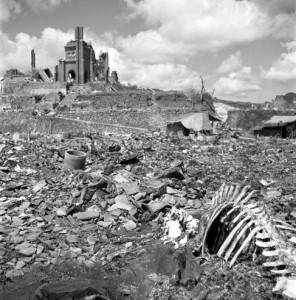
On the 6th of August, 67 years ago, the world changed in one horrific instant. Consider the following perspective
“The destruction of Hiroshima and Nagasaki was a war crime worse than any that Japanese generals were executed for in Tokyo and Manila. If Harry Truman was not a war criminal, then no one ever was.”
A radical departure from the conventional history, Ralph Raico has provided a disturbing summary and assessment of the these two atomic bombings. Raico provides facts, references, morality, and utility into his arguments.
- 200,000 Dead: the approximate number of people killed from these two bombs; vast majority were civilians
- Non Military Target: Hiroshima was not even in the top 30 of the US Bomber Command’s target priority list.
- Immoral and Unnecessary – even many high ranking military and political officials condemned the decision as immoral and/or unnecessary
The linked Raico excerpt above is only the start of the discussion. A few other points to consider and research further for yourselves
- Was Japan a good and virtuous country at this time?
- Absolutely not, they were committing some horrific acts against their neighbors, and their attack on Pearl Harbor fails most every ‘just war’ theory – – particularly a libertarian view
- Did the US intentionally provoke Japan into attacking?
- Yes, an explicit 8 point plan was documented and followed almost to the letter.
- Did FDR know the Japanese were going to attack Pearl Harbor?
- Again, the evidence indicates that he did know in advance, but let it occur in order to galvanize public opinion into accepting a declaration of war.
- At the time of the bombing, was the Japanese military threat effectively neutralized at this point of the war?
- Yes
- Prior to Hirosihma, did the US military already kill tens of thousands of Japanese civilians during firebombing raids?
- Yes
- Was the US military retalliation proportional to the Japanese military attack?
- From a moral/philosophic perspective – – If country A’s military kills 3,000 of country B’s soldiers, is it appropriate for B to kill 300,000 of A’s civilians and soldiers?
- Did the USA consider and exhaust all other options before dropping the two atomic bombs?
- No!
- Threat neutralized? Had the USA decimated Japanese offensive capabilities enough to not be a major threat? If yes, withdraw unilaterally? I equate this to you whoopin’ a guys butt, and leaving even though he never said uncle.
- Peace Treaty? Could some sort of peace treaty have been reached? “I’m leaving, as long as you agree not to mess with me anymore.” If not – –
- Conditional Surrender? Some degree of surrender, with terms that may be less than preferred — but will save all the lives? This is definitively the viewpoint presented in the article above, and shared by many in the military high command (e.g. MacArthur). Or do we demand the guy not only say uncle, but lick our boots, change his name to Suzy…etc. Why exactly was Truman’s demand for ‘Unconditional Surrender’ the only option, and any alternative warranted hundreds of thousands of innocents to die?
- Explicit evidence and threats? FDR could have invited the Emporer and “Uncle Joe” Stalin out to bikini atoll 2 to watch a demonstration. “If you don’t surrender, this is what will happen to Tokyo – – oh, and the Soviets are going to start attacking as well. You feel like surrendering now??!” If you can’t give a demo, at least deliver a warning and ultimatum – – any final ditch attempt to avoid doing this evil thing!
- No!
- Are WMDs, such as these particular atomic bombs inherently evil?
- Yes. Rothbardian analysis notes their inability to pinpoint defensive force to your aggressors only (i.e. they necessarily harm the innocent) – – thus every society (state or anarchist) should strive to prevent their use and entire existence.
- Is the USA the only country to have ever utilized an atomic WMD during war?
- Yes
- If Germany or another country had done the exact same bombings against USA cities (2 atomic bombs, 200,000 mostly civilian dead, justified as required to get the USA to surrender and avoid a land invasion) – – how would we view their actions from a moral perspective?
- I hope this is rhetorical and the answer is obvious…
For more visual history, Life Magazine has pictures of the survivors and ruins. The anime video below provides another gut wrenching view into these atrocities
+++++++++++++++
A few other links if interested in reading further
Listing of prominent individuals against dropping the bombs: Eisenhower, Macarthur, Einstein, Robert McNamara, and many, many others
http://en.wikipedia.org/wiki/Debate_over_the_atomic_bombings_of_Hiroshima_and_Nagasaki
http://www.lewrockwell.com/raico/raico22.html
Japanese intentionally and repeatedly provoked by FDR; subsequent evidence US gov’t knew the attack was coming. The oil embargo was part of an extended 8 point list. So, “should we have fought in this war?”


A few points to couentr the pro-bombing fraternity:1. the estimate of “one million” American casualties expected in an invasion of the Japanese homeland was a complete guess, even a fabrication for political purposes2. an important factor in galvanizing the Japanese public behind the failing war effort was the American demand for “unconditional surrender” which was stupid and couentrproductive (they “let” them keep their beloved emperor anyway) 3. a number of senior American generals knew that if they had not won the war they would have been up for war crimes trials for what they had done4. a number of senior generals involved in the Manhattan Project knew that if they didn’t use the bomb then Congress would ask some troubling questions about the massive secret expenditure of so much money without congressional approval5. Many scientists involved in the project withdrew after Germany surrendered because they (falsely) believed Germany was close to developing the bomb. They thought bombing Japan would be immoral and uncalled for6. killing so many civilians (and POWs as well let’s not forget) is wrong on the most basic of libertarian principles. Why do we keep having to make this most basic of points?It seems some libertarians love their own state more than they love liberty.